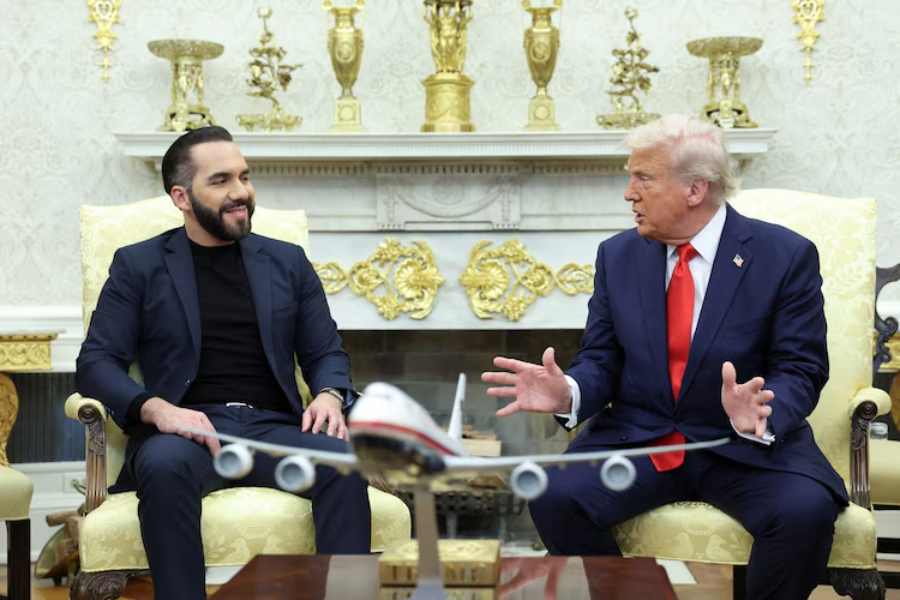In a stunning and controversial Oval Office moment on Monday, former President Donald Trump floated a bold and legally murky idea: deport violent American citizens to El Salvador for imprisonment. During a meeting with Salvadoran President Nayib Bukele, Trump casually suggested that U.S.-born criminals, whom he referred to as “homegrowns,” should be added to the list of foreign gang members already being detained in the Central American country.
Captured on a livestream from Bukele’s office, the exchange ignited immediate backlash and legal concern across political and constitutional circles. But Trump, never one to shy away from controversy, appeared resolute. “Homegrown criminals are next,” he told Bukele, referencing American citizens involved in violent crimes. “You’ve got to build about five more places,” he added, alluding to El Salvador’s existing prison infrastructure.
Bukele, known for his iron-fisted approach to crime and his cooperation with Trump-era immigration policies, didn’t object. “Yeah, we’ve got space,” he responded with a grin, prompting laughter among Trump’s aides.
Trump wasn’t laughing. “It’s not big enough,” he replied.
From Deportation to Detention Abroad
The idea may sound shocking, but Trump has already partnered with El Salvador to detain non-U.S. citizens, many accused of gang affiliation, who have been deported from the United States. These individuals are being held at the Centro de Confinamiento del Terrorismo (CECOT), a maximum-security prison notorious for its harsh conditions. Among the detainees is Kilmar Abrego Garcia, a Maryland resident and father who was deported under accusations of being linked to MS-13, one of the region’s most violent gangs.
However, Abrego Garcia’s case is mired in controversy. A U.S. federal court ruled that his deportation was wrongful, and the Supreme Court has since ordered the Trump administration to facilitate his return to the United States. Despite this legal ruling, Bukele made it clear during Monday’s meeting that he had no intention of complying.
“I don’t have the power to return him,” Bukele told reporters. “Of course, I’m not going to do it.”
A Legal and Constitutional Firestorm
Legal scholars were quick to point out the severe constitutional issues with Trump’s newest proposition. The idea of sending natural-born or naturalized American citizens to be imprisoned in foreign facilities runs afoul of numerous civil and human rights protections. It also raises serious questions about due process, sovereignty, and international law.
“Incarcerating U.S. citizens in another country without due process is unconstitutional—plain and simple,” said one constitutional law expert. “Even proposing such a policy is unprecedented and dangerous.”
Nonetheless, Trump doubled down. In his remarks to the press following the meeting, he painted a vivid and emotional picture of domestic crime, referencing subway attacks and assaults on elderly citizens to justify his push.
“These people are absolute monsters,” he said. “They push people into subways, hit elderly ladies with baseball bats… I’d like to include them in the group to get them out of the country.”
He then turned to Stephen Miller, his longtime immigration policy architect and current deputy White House chief of staff, to explore the legal framework necessary to make such deportations happen.
“We always have to obey the laws,” Trump said. “But you’ll have to be looking at the laws on that, Steve.”
Attorney General Weighs In
Adding another layer of seriousness to the suggestion, Trump revealed that his Attorney General, Pam Bondi, is now studying the legality of sending U.S. citizens abroad for incarceration. “If it’s a homegrown criminal, I have no problem,” Trump said. “Pam is studying if we can do that. And I’m talking about violent people. I’m talking about really bad people.”
Bondi, known for her loyalty to Trump and hardline legal positions, has not yet released a formal opinion. However, her involvement suggests that the former president may be preparing to elevate this idea from political theater to policy proposal.
Bukele’s Role: Warden of Trump’s Vision?
President Bukele has long been a key ally in Trump’s hardline immigration agenda. He rose to global prominence with his crackdown on gangs and his unapologetically authoritarian leadership style, often dubbing himself “the world’s coolest dictator.”
On Monday, Bukele embraced Trump’s comments and reinforced the narrative with a dramatic declaration: “Mr. President, you have 350 million people to liberate,” he said. “But to liberate 350 million people, you have to imprison some.”
His comment underscores the philosophical alignment between the two leaders: a belief that safety and order must be secured through strict enforcement and, if necessary, authoritarian measures.
Domestic Reaction: Critics Slam the Proposal
Back in the U.S., civil rights organizations, legal scholars, and even some political opponents were swift and sharp in their condemnation.
“This isn’t just unconstitutional—it’s dystopian,” said an ACLU spokesperson. “You can’t simply offload your own citizens onto another country’s prison system because they’ve committed a crime.”
Democratic lawmakers also weighed in, accusing Trump of fearmongering and authoritarianism.
“This proposal is pure authoritarian fantasy,” said Senator Elizabeth Warren. “What Trump is suggesting is not only illegal, it’s immoral. Our justice system cannot be outsourced.”
Even among Republicans, there was unease. While some of Trump’s base cheered his tough talk on crime, others in the party quietly acknowledged the logistical and legal nightmares that such a plan would invite.
What Comes Next?
Whether Trump’s idea gains legal traction or fades into the dustbin of controversial campaign rhetoric remains to be seen. But one thing is clear: the former president continues to test the boundaries of traditional American governance and the Constitution.
With Attorney General Pam Bondi exploring the legal possibilities and Stephen Miller likely drafting proposals, this may be more than just a rhetorical moment. Trump has never been shy about pushing the envelope, and this latest plan to exile violent U.S. criminals to El Salvador may become a defining talking point of his political future.
As Bukele opens more prison cells, America watches to see whether the cells might one day house not just foreigners, but its own citizens.


